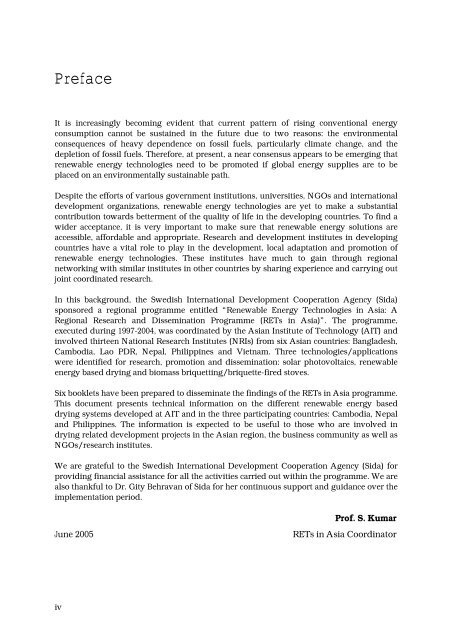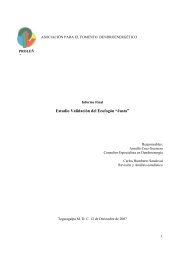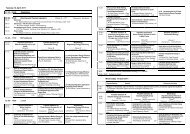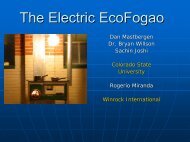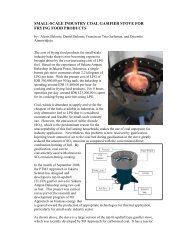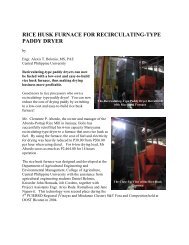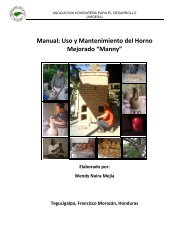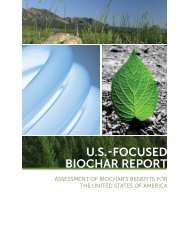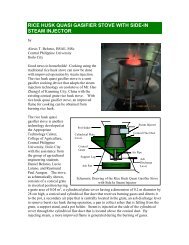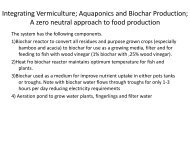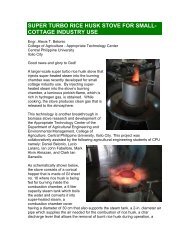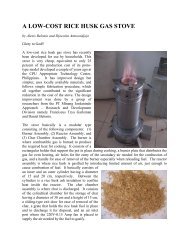Solar, Biomass and Hybrid Dryers - BioEnergy Discussion Lists
Solar, Biomass and Hybrid Dryers - BioEnergy Discussion Lists
Solar, Biomass and Hybrid Dryers - BioEnergy Discussion Lists
Create successful ePaper yourself
Turn your PDF publications into a flip-book with our unique Google optimized e-Paper software.
PrefaceIt is increasingly becoming evident that current pattern of rising conventional energyconsumption cannot be sustained in the future due to two reasons: the environmentalconsequences of heavy dependence on fossil fuels, particularly climate change, <strong>and</strong> thedepletion of fossil fuels. Therefore, at present, a near consensus appears to be emerging thatrenewable energy technologies need to be promoted if global energy supplies are to beplaced on an environmentally sustainable path.Despite the efforts of various government institutions, universities, NGOs <strong>and</strong> internationaldevelopment organizations, renewable energy technologies are yet to make a substantialcontribution towards betterment of the quality of life in the developing countries. To find awider acceptance, it is very important to make sure that renewable energy solutions areaccessible, affordable <strong>and</strong> appropriate. Research <strong>and</strong> development institutes in developingcountries have a vital role to play in the development, local adaptation <strong>and</strong> promotion ofrenewable energy technologies. These institutes have much to gain through regionalnetworking with similar institutes in other countries by sharing experience <strong>and</strong> carrying outjoint coordinated research.In this background, the Swedish International Development Cooperation Agency (Sida)sponsored a regional programme entitled “Renewable Energy Technologies in Asia: ARegional Research <strong>and</strong> Dissemination Programme (RETs in Asia)”. The programme,executed during 1997-2004, was coordinated by the Asian Institute of Technology (AIT) <strong>and</strong>involved thirteen National Research Institutes (NRIs) from six Asian countries: Bangladesh,Cambodia, Lao PDR, Nepal, Philippines <strong>and</strong> Vietnam. Three technologies/applicationswere identified for research, promotion <strong>and</strong> dissemination: solar photovoltaics, renewableenergy based drying <strong>and</strong> biomass briquetting/briquette-fired stoves.Six booklets have been prepared to disseminate the findings of the RETs in Asia programme.This document presents technical information on the different renewable energy baseddrying systems developed at AIT <strong>and</strong> in the three participating countries: Cambodia, Nepal<strong>and</strong> Philippines. The information is expected to be useful to those who are involved indrying related development projects in the Asian region, the business community as well asNGOs/research institutes.We are grateful to the Swedish International Development Cooperation Agency (Sida) forproviding financial assistance for all the activities carried out within the programme. We arealso thankful to Dr. Gity Behravan of Sida for her continuous support <strong>and</strong> guidance over theimplementation period.June 2005Prof. S. KumarRETs in Asia Coordinatoriv


